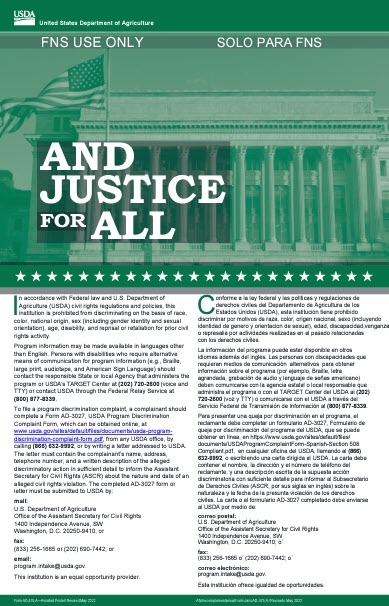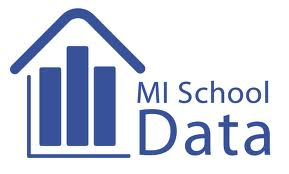Wellness Policy
 The Mount Morris Consolidated Schools is committed to creating a healthy school environment that enhances the development of lifelong wellness practices to promote healthy eating and physical activities that support student achievement and hereby adopts this Student Wellness Policy.
The Mount Morris Consolidated Schools is committed to creating a healthy school environment that enhances the development of lifelong wellness practices to promote healthy eating and physical activities that support student achievement and hereby adopts this Student Wellness Policy.
Nutrition Education
Every year, all students, Pre - K-12, shall receive nutrition education that is aligned with the Michigan Health Education Content Standards and Benchmarks. Nutrition education that teaches the knowledge, skills, and values needed to adopt healthy eating behaviors shall be integrated into the curriculum. Nutrition education information shall be offered throughout the school campus including, but not limited to, school dining areas and classrooms. Staff members who provide nutrition education shall have the appropriate training.
Nutrition Standards
The District shall ensure that reimbursable school meals meet the program requirements and nutrition standards found in federal regulations. The District shall encourage students to make nutritious food choices.
The District shall monitor all food and beverages sold or served to students, including those available outside the federally regulated child nutrition programs. The District shall consider nutrient density and portion size before permitting food and beverages to be sold or served to students.
The Superintendent shall annually evaluate vending policies and contracts. Vending contracts that do not meet the intent and purpose of this policy may be modified accordingly or not renewed.
Physical Education and Physical Activity Opportunities
The District shall offer physical education opportunities that include the components of a quality physical education program. Physical education shall equip students with the knowledge, skills, and values necessary for lifelong physical activity. Physical education instruction shall be aligned with the Michigan Physical Education Content Standards and Benchmarks.
Every year all students, Pre-K-12, shall have the opportunity to participate regularly in supervised physical activities, either organized or unstructured, intended to maintain physical fitness and to understand the short- and long-term benefits of a physically active and healthy lifestyle.
Other School-Based Activities Designed to Promote Student-Wellness
The District may implement other appropriate programs that help create a school environment that conveys consistent wellness messages and is conducive to healthy eating and physical activity.
Implementation and Measurement
The Superintendent shall implement this policy and measure how well it is being managed, and enforced. The Superintendent shall develop and implement administrative rules consistent with this policy. Input from teachers (including specialists in health and physical education), school nurses, parents/guardians, students, representatives of the school food service program, the Board of Education, school administrators, other school personnel and the public shall be considered before implementing such rules.
A sustained effort is necessary to implement and enforce this policy. The Superintendent shall report to the Board, as requested, on the District's programs and efforts to meet the purpose and intent of this policy.
Approved: September 26, 2006
LEGAL REF: Section 204 of Public Law 108-265 (Child Nutrition and WIC Reauthorization Act of 2004) (Approved by the Michigan State Board of Education, October 10, 2005.)
Non-Discrimination Statement

In accordance with federal civil rights law and U.S. Department of Agriculture (USDA) civil rights regulations and policies, this institution is prohibited from discriminating on the basis of race, color, national origin, sex (including gender identity and sexual orientation), disability, age, or reprisal or retaliation for prior civil rights activity.
Program information may be made available in languages other than English. Persons with disabilities who require alternative means of communication to obtain program information (e.g., Braille, large print, audiotape, American Sign Language), should contact the responsible state or local agency that administers the program or USDA’s TARGET Center at (202) 720-2600 (voice and TTY) or contact USDA through the Federal Relay Service at (800) 877-8339.
To file a program discrimination complaint, a Complainant should complete a Form AD-3027, USDA Program Discrimination Complaint Form which can be obtained online at: https://www.usda.gov/sites/default/files/documents/ad-3027.pdf, from any USDA office, by calling (866) 632-9992, or by writing a letter addressed to USDA. The letter must contain the complainant’s name, address, telephone number, and a written description of the alleged discriminatory action in sufficient detail to inform the Assistant Secretary for Civil Rights (ASCR) about the nature and date of an alleged civil rights violation. The completed AD-3027 form or letter must be submitted to USDA by:
- mail:
U.S. Department of Agriculture
Office of the Assistant Secretary for Civil Rights
1400 Independence Avenue, SW
Washington, D.C. 20250-9410; or - fax:
(833) 256-1665 or (202) 690-7442; or - email:
[email protected]
This institution is an equal opportunity provider.

